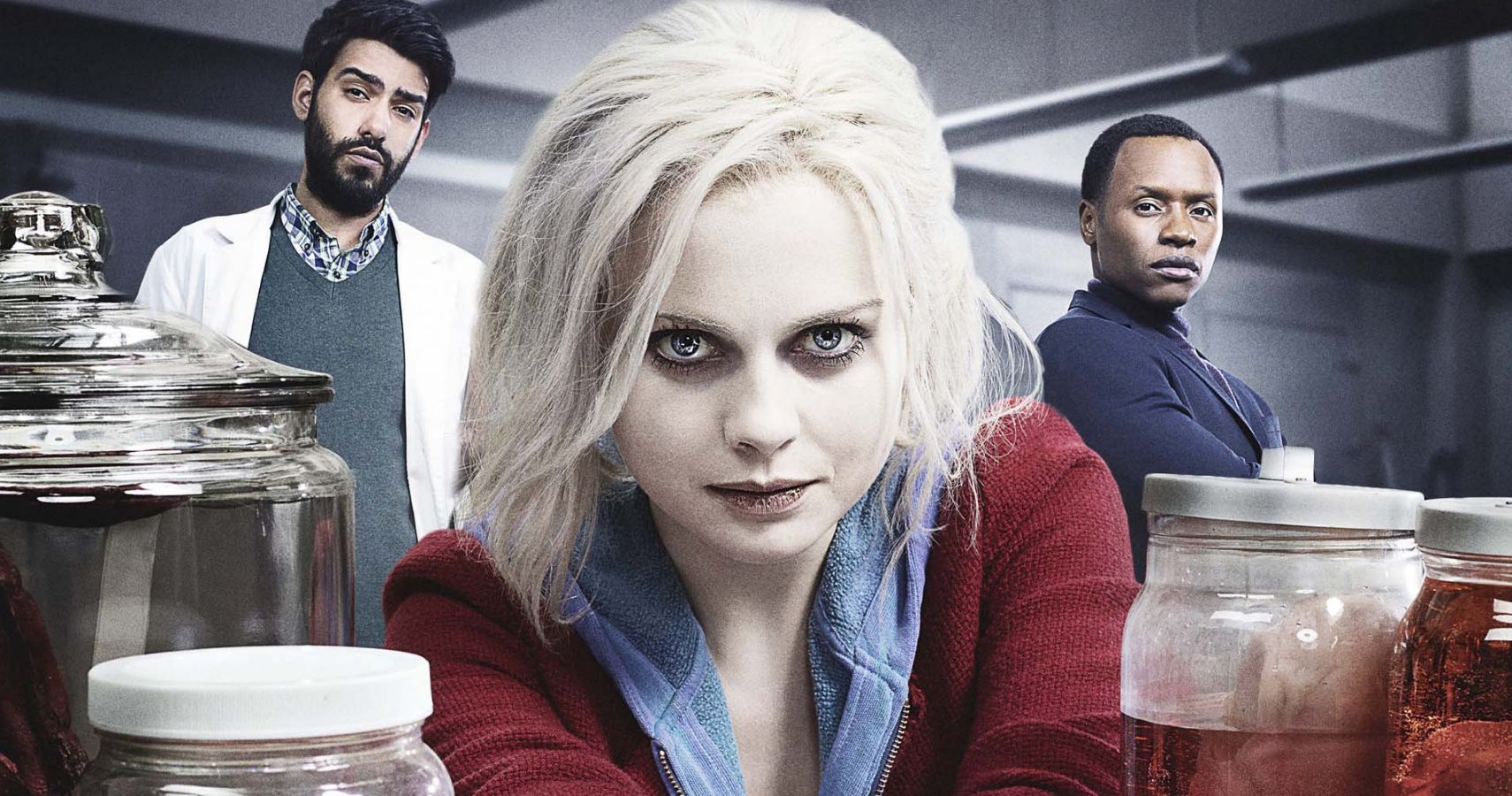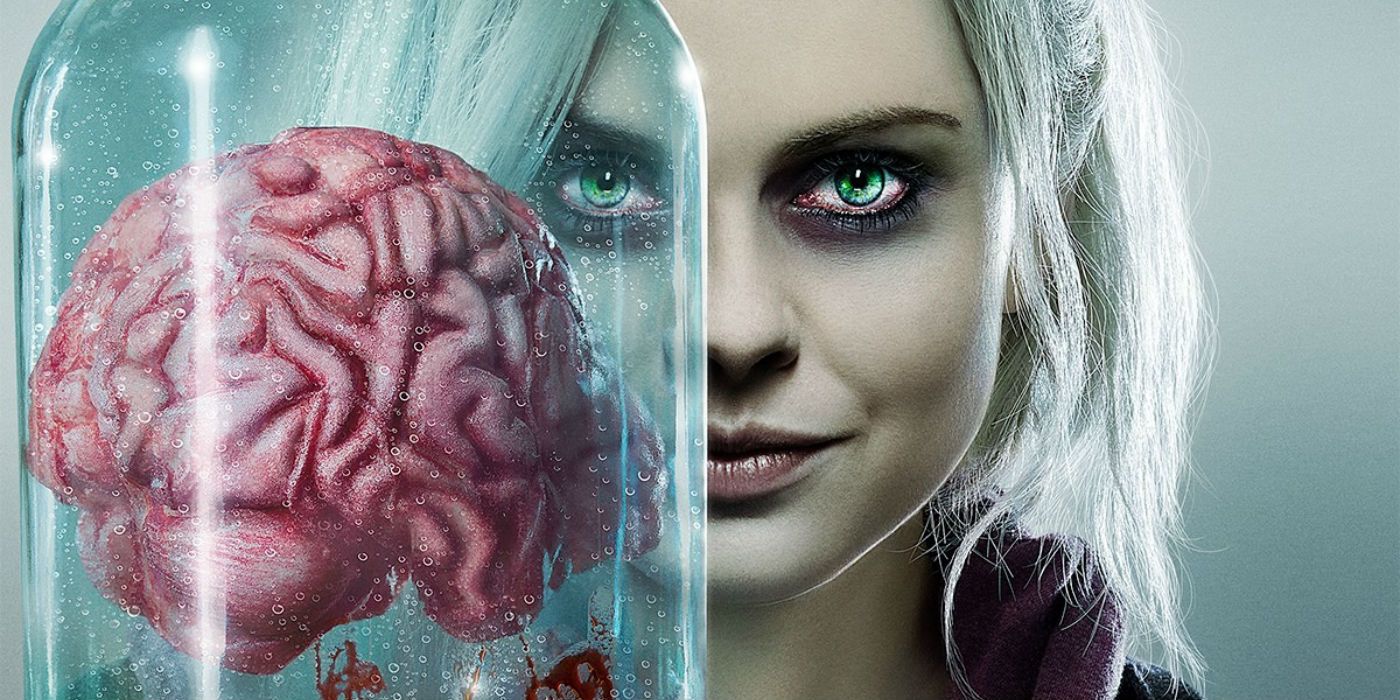iZombie doesn’t get the credit it deserves.
Premiering on the CW in 2015, the show started with a fairly simple premise: a police procedural – but with zombies! The hour-long dramedy, however, quickly evolved into a fascinating exploration of the living dead subgenre. Throughout five seasons, iZombie created a complex mythology of its own and gave zombies a depth not seen on any other television show.
Developed by Rob Thomas and Diane Ruggiero-Wright (the team behind Veronica Mars), iZombie was an extraordinarily loose adaptation of the comic book series of the same name, created by Chris Roberson and Michael Allred, and published by DC Comics’ Vertigo imprint for twenty-eight issues from 2010 to 2012. iZOMBIE, as the comic was titled, followed the misadventures of a grave-digging zombie, just trying to fit in.
The show moves the setting from Oregon to Seattle and focuses on med student-turned-zombie-turned-medical examiner Olivia “Liv” Moore, played by Rose McIver. She and her boss Ravi Chakrabarti (Rahul Kohli) partner with Seattle Police detective Clive Babineaux (Malcolm Goodwin), using her gifts to help him solve murders. Those gifts, by the way, are about all the show and source material have in common and are just the first tweak to the standard zombie formula that the show offers.
After eating a deceased person’s brains, the zombie in question will be able to see visions of that person’s life – something that’s incredibly handy when trying to solve a mysterious death. The zombie will also take on characteristics of the victim, which, in the course of the show, allowed McIver to, essentially, play a different character every week.
This constant transformation helped the show change from week to week, too, never getting lost underneath the weight of its own gimmick. iZombie wasn’t afraid to get serious, or utterly ridiculous, or, in Season 5, go full noir for absolutely no reason at all. McIver’s Liv could be anything, at any time, from a kleptomaniac to a Dungeon Master to a drag queen. (Something that Rahul Kohli’s Ravi finally got in on in later seasons, too.)
Beneath the costumes and oversized personalities, though, iZombie consistently showcased the decidedly personal struggles of a human-turned-revenant. The first few seasons were guidebooks about how to survive as a zombie: how to hide a massive, potentially monstrous secret and steal brains without hurting anyone. After the introduction of a cure, characters were shown struggling with the desire to be human again – or not. And, with zombie paramilitary organization Fillmore Graves – this show was not subtle – and the ascension of Liv’s ex Major Lilywhite (Robert Buckley) to a commanding role, iZombie took on a bit of a philosophical bent, with Major wondering what he, and zombiekind, owed to the world, and what line he would or wouldn’t cross to keep them safe.
Because that, too, was another difference to the old tropes: the zombies of iZombie were humans first and foremost. They only went “full Romero” if they didn’t eat enough brains. Rather than being a slavering horde, the zombies were given individual identities – a kind of werewolf treatment, if you will, a desperate victim constantly trying to keep the monster inside at bay.
The day-to-day realities of this kind of world are also present, developing exponentially over the show with a scope even the best of Peak TV wouldn’t dare. Liv, believing herself to be the only zombie in the world, becomes a medical examiner so she’ll have a steady supply of brains, cutting herself off from her old life. Soon, though, she discovers she’s not, and drug-dealing ne’er-do-well (and consistently underrated supervillain) Blaine "DeBeers" McDonough, played by David Anders, begins a black market brain delivery service.
Things don’t get smaller from there, everything escalating with each new reveal: The CEO of an energy drink company decides to weaponize Romeros, building an army in his basement. The aforementioned zombie-only paramilitary organization appears, followed by a zombie cult, and then pro- and anti-zombie terrorist groups. Ravi experiments on himself and becomes a zombie for a single week each month. Seattle is walled off. Brains are processed and shipped in by the government. The entirety of the fifth and final season is spent under the threat of nuclear annihilation, with our heroes desperately scrambling for a cure.
RELATED: Supergirl Welcomes Back iZombie's Rahul Kohli for Season 5
Can you imagine The Walking Dead doing all that? No, of course not.
Because The Walking Dead isn’t a zombie show; it’s a survivalist drama. The “walkers” are a constant but vague threat that could just as easily have been vampires or sewer mutants or robots or whatever was going on in Bird Box. The titular “walking dead,” as the show repeatedly reminds us, are the humans – the real monsters aren’t the ones that eat brains.
The Walking Dead, of course, isn’t alone in relegating zombies to the sidelines – and given the side-by-side ratings of the two shows, maybe that’s what people want. Which is kind of a shame.
Because iZombie offered a fresh take on the genre, taking a groundbreaking idea and running with it, full-tilt. By throwing off the shackles of traditional zombie fare, the show was free to do whatever it wanted, however it wanted, exploring its own take on the walking dead and developing a fascinating mythology all its own.
iZombie may be over, but long may she reign.




